The average cost of a commercial boiler ranges from $4,000 to $20,000, depending on the type, efficiency, and installation needs. Fire-tube boilers generally cost between $4,000 and $9,000, while condensing boilers can go from $10,000 to $20,000. Factors like boiler type, energy efficiency ratings, and installation complexities play significant roles in pricing. Understanding these elements helps in making an informed choice, and there's more to explore about long-term savings and financing options.
Key insights
- Traditional fire-tube commercial boilers typically range from $4,000 to $9,000, while condensing models cost between $10,000 and $20,000.
- Boiler costs vary based on type, installation requirements, and energy efficiency ratings.
- Energy source impacts costs; natural gas boilers often have lower initial expenses compared to electric models.
- Proper sizing is crucial; oversized boilers can lead to inefficiencies and increased costs.
- Additional installation costs may arise from site preparation, local regulations, and contractor selection.
Understanding Commercial Boiler Types
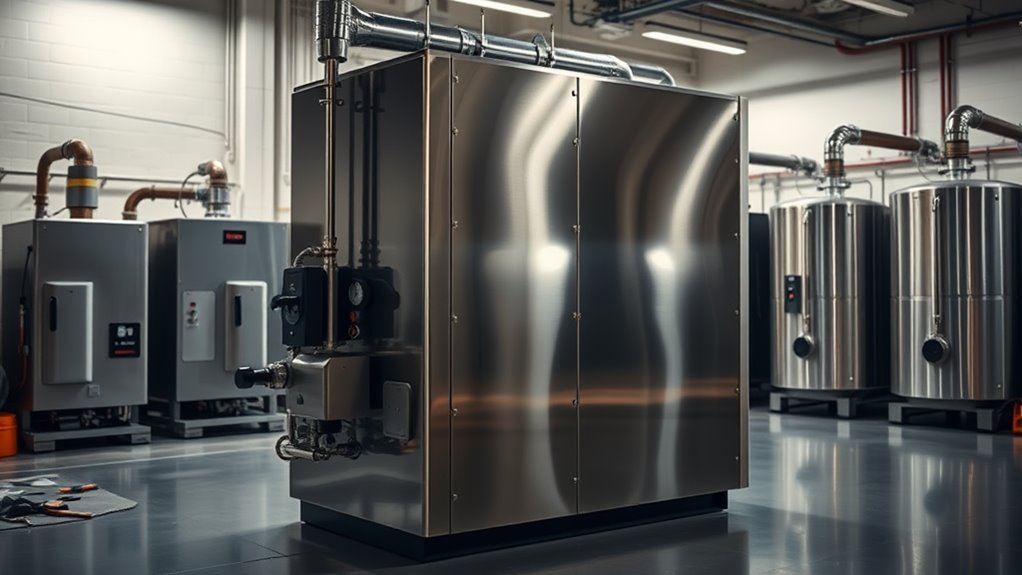
When selecting a commercial boiler, it's crucial to understand the various types available, as each serves specific needs and applications. You'll encounter different boiler technologies, including fire-tube and water-tube designs, which cater to varying efficiency and capacity requirements. Fire-tube boilers are often more compact, while water-tube models handle higher pressures and larger capacities. Additionally, consider the energy sources that power these systems, such as natural gas, propane, or electric options. Each energy source impacts operational efficiency and environmental considerations. By evaluating your facility's requirements and reviewing these boiler types, you guarantee peak performance and energy efficiency tailored to your specific application. This knowledge lays the groundwork for making informed decisions in your boiler selection process. Moreover, understanding compliance with safety regulations is vital, as it ensures that your boiler installation meets local codes and operates safely.
Factors Influencing Boiler Costs
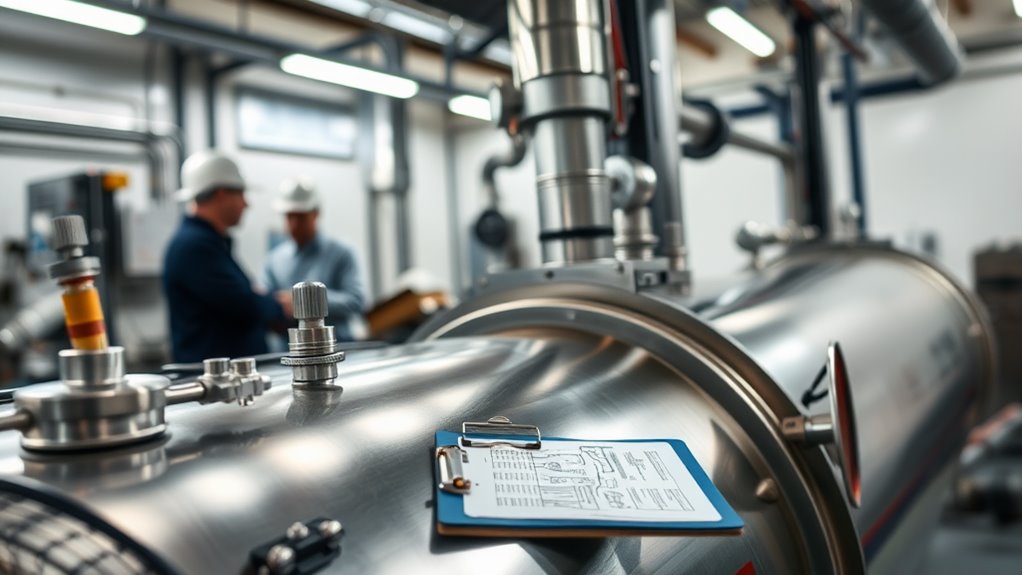
When considering the cost of a commercial boiler, several key factors come into play. Your choice of boiler type, the specific installation requirements, and the energy efficiency ratings all greatly impact the overall expense. Understanding these elements will help you make an informed decision that aligns with your operational needs and budget. Regular servicing and energy efficiency are crucial for maintaining low operational costs and extending the lifespan of your boiler.
Boiler Type Selection
Selecting the right boiler type is vital, as it greatly influences overall costs and efficiency. The first factor to take into account is boiler size; an appropriately sized boiler guarantees peak performance and prevents energy wastage. Oversized units can lead to higher operational costs due to frequent cycling, while undersized units may struggle to meet demand, causing inefficiencies.
Next, fuel type plays an important role in determining both initial and ongoing expenses. Gas, oil, and electric boilers each have distinct cost implications and efficiency ratings. Your choice should align with local fuel availability and pricing, as well as your facility's specific heating needs. By evaluating these factors carefully, you can select a boiler type that balances upfront costs with long-term savings and efficiency. Additionally, considering energy-efficient heating solutions can further enhance your facility's sustainability and reduce operational costs.
Installation Requirements
Understanding installation requirements is essential, as they profoundly impact the overall cost of your commercial boiler. Factors like site preparation, accessibility, and the complexity of the boiler installation can greatly affect pricing. You'll need to comply with local safety regulations, which can vary by region and may require additional permits or inspections. Considerations such as the existing infrastructure, including piping and electrical connections, can also influence installation costs. If structural modifications are necessary to accommodate your new boiler, that'll add to your expenses as well. Working with experienced professionals assures compliance with safety regulations and efficient installation, ultimately saving you time and potential costs associated with future issues. Additionally, choosing energy-efficient heating systems can significantly lower operational expenses in the long run.
Energy Efficiency Ratings
Installation requirements play a significant role in determining your commercial boiler's overall cost, especially when factoring in energy efficiency ratings. The energy efficiency of your boiler is vital, as it directly impacts operating costs and environmental compliance. Rating systems like the Annual Fuel Utilization Efficiency (AFUE) and Seasonal Efficiency factor into your decision-making. Higher efficiency ratings generally lead to increased upfront costs due to advanced technology and materials. However, the long-term savings on fuel consumption can offset these initial investments. When evaluating options, consider both the rating systems and your operational demands. A well-rated boiler not only enhances energy efficiency but also boosts your facility's overall performance and sustainability. Regular commercial power flushing can further improve system efficiency and reduce energy costs.
Average Purchase Prices for Different Boiler Types
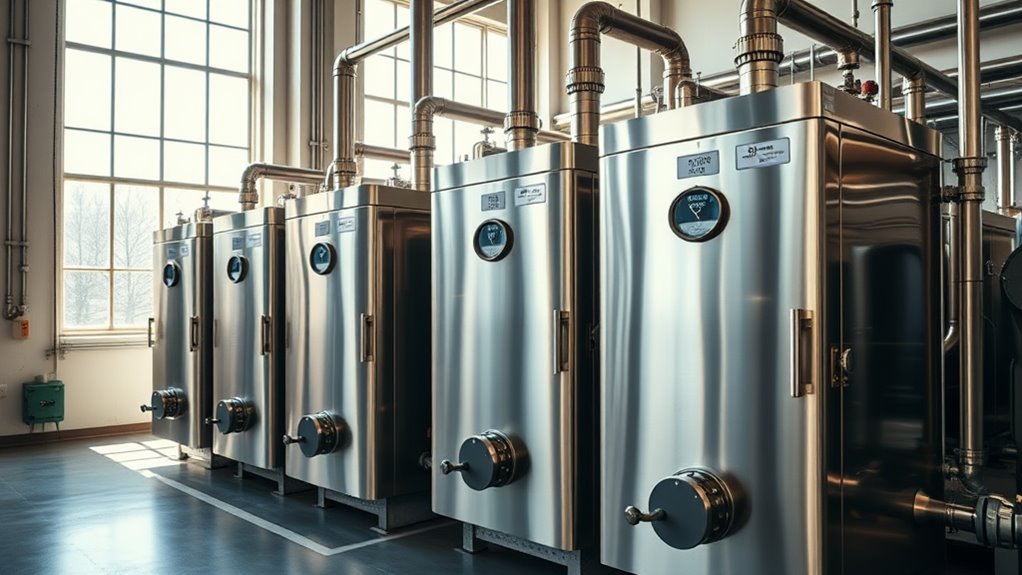
When considering the average purchase prices for different boiler types, you'll notice significant variations based on the specific model and its intended application. Installation costs also play a vital role in the overall investment, as they can vary widely depending on the complexity of the setup. Additionally, the energy efficiency of each boiler type can impact both initial costs and long-term savings, making it essential to weigh these factors carefully. Regular maintenance helps prevent error codes and enhances boiler longevity, contributing to overall cost-effectiveness.
Boiler Type Variations
Choosing the right type of commercial boiler greatly impacts your overall investment, as prices can vary widely based on the technology and capacity you require. For instance, traditional fire-tube boilers generally range from $4,000 to $9,000, while more advanced condensing boilers can cost between $10,000 and $20,000. Additionally, boiler fuel type plays a significant role; oil-fired models tend to be more expensive initially than natural gas options. Higher-capacity boilers, designed for larger facilities, will also increase your investment. When evaluating options, consider not just the purchase price but also the efficiency and long-term operational costs associated with different boiler types. This thorough analysis will help you make a more informed decision tailored to your specific needs. Regular preventative maintenance can also help extend the lifespan and efficiency of your boiler investment.
Installation Costs Factor
Understanding the average purchase prices for different boiler types is crucial for accurately estimating installation costs. The installation process varies considerably based on the boiler type—whether it's a fire-tube, water-tube, or condensing model. Each type has its own cost implications, impacting your overall budget. For instance, condensing boilers may have higher initial prices but offer more efficiency. When considering contractor selection, make sure you choose a qualified professional experienced with the specific boiler type you're installing. Labor costs can vary, and hiring an expert can streamline the installation process, potentially saving you money in the long run. By evaluating both the purchase price and installation fees together, you'll secure a thorough understanding of your total investment. Regular plant room maintenance is essential to ensure the longevity and efficiency of your boiler system.
Energy Efficiency Impact
Energy efficiency greatly influences the average purchase prices of various boiler types. When evaluating your investment, you should weigh the energy efficiency benefits against upfront costs. Here are key factors to keep in mind:
- Type of Boiler: High-efficiency condensing boilers usually have higher purchase prices but offer significant long-term savings.
- Fuel Type: Natural gas boilers may be cheaper initially but can vary in efficiency compared to electric options.
- Size and Capacity: Oversized boilers can lead to inefficiencies; selecting the right size is essential.
- Efficiency Improvement Strategies: Implementing advanced controls and maintenance can enhance overall performance, affecting long-term costs. Additionally, regular maintenance ensures efficient boiler operation and can prevent costly repairs down the line.
Incorporating these insights will help you make a more informed investment decision.
Installation Costs and Considerations
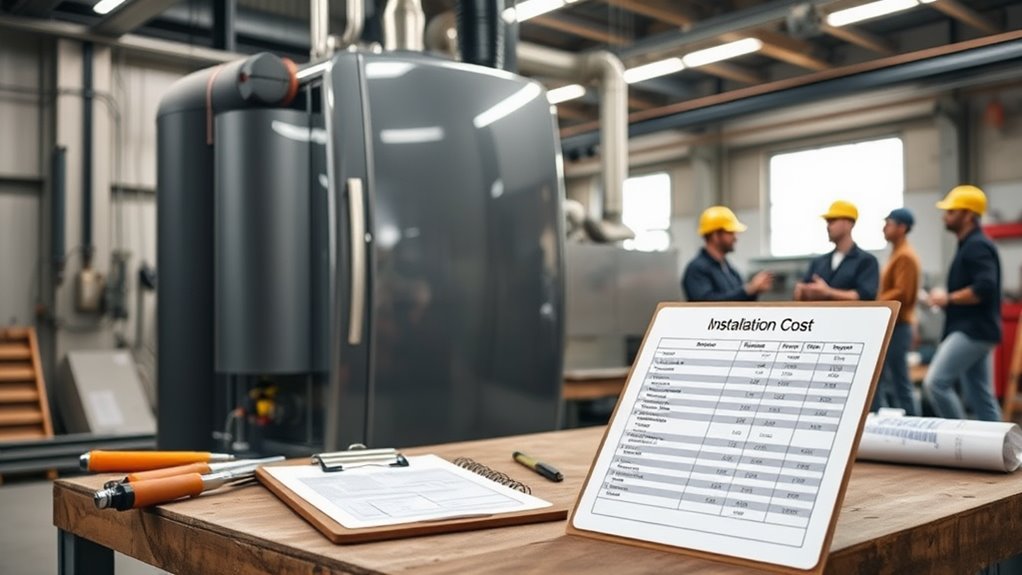
When planning the installation of a commercial boiler, it's important to contemplate various factors that can greatly impact overall costs. One significant aspect is contractor selection; choosing a qualified contractor can minimize installation challenges and guarantee compliance with local codes. Evaluate their experience, credentials, and previous work to make an informed decision. Additionally, consider the complexity of your site, as installation may require modifications to existing infrastructure, which can escalate costs. Access to the installation location is also critical; limited space can lead to higher labor expenses. Finally, factor in any necessary permits and inspections, as these can add to the overall budget. Thorough planning and diligent contractor selection are fundamental to a successful boiler installation. Moreover, obtaining a Commercial Gas Safety Certificate is essential to ensure the safe operation of the boiler and compliance with regulations.
Ongoing Maintenance Expenses
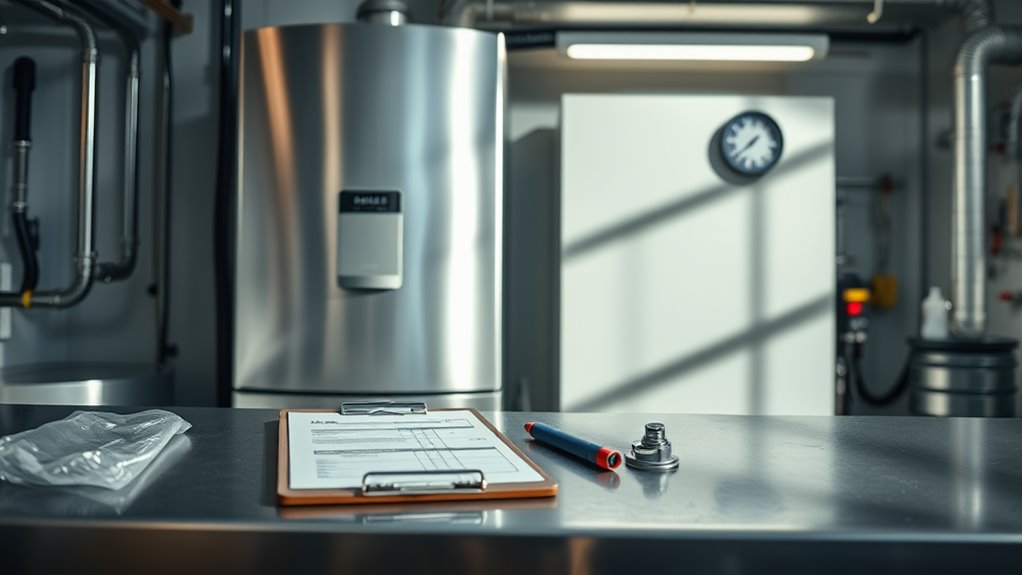
Proper installation is just the beginning; ongoing maintenance expenses are a critical consideration for commercial boiler ownership. To guarantee peak performance and longevity, you'll need to factor in several ongoing costs:
- Routine Servicing: Regular check-ups help identify issues before they escalate.
- Repair Frequency: The age and use of your boiler determine how often repairs are needed.
- Parts Replacement: Over time, certain components will need replacing due to wear and tear.
- Emergency Repairs: Unforeseen breakdowns can lead to significant costs, so having a contingency budget is wise.
Energy Efficiency Ratings and Their Impact on Cost
Understanding energy efficiency ratings is essential, as these ratings directly influence both the upfront costs and long-term savings of a commercial boiler. Higher energy efficiency labels indicate better performance, which often translates to lower energy consumption and reduced operational costs. When you invest in a boiler with a superior efficiency rating, you're likely to see a return on investment through significant energy savings over time. Incorporating energy consumption monitoring can further optimize your boiler's efficiency, allowing you to track usage patterns and make informed adjustments. While the initial cost may be higher for more efficient models, the cumulative savings on energy bills can outweigh the upfront expense, making it a financially sound choice for your commercial space.
Financing Options for Commercial Boilers
How can you effectively manage the financial burden of purchasing a commercial boiler? Exploring various financing options can ease your cash flow concerns. Here are four key avenues to evaluate:
- Commercial Loans: Traditional bank loans offer long repayment terms and fixed interest rates, making them a common choice.
- Equipment Financing: This type of loan allows you to secure funding specifically for the boiler, using it as collateral.
- Leasing: Leasing arrangements provide lower upfront costs and flexible payment terms, allowing you to upgrade equipment easily.
- Government Grants and Incentives: Investigate local and federal programs that support energy-efficient boiler installations, potentially reducing your overall costs.
Cost Comparison: New vs. Used Boilers
When weighing financing options for a commercial boiler, it's important to evaluate the cost implications of both new and used models. New boilers offer several advantages, such as improved energy efficiency, advanced technology, and extended warranties. These factors often lead to lower operational costs over time. However, the initial purchase price can be considerably higher.
On the other hand, used boilers typically present a more budget-friendly option. Yet, they come with notable drawbacks, including potential maintenance issues, shorter lifespan, and the absence of modern features that enhance efficiency. Ultimately, your decision should hinge on balancing upfront costs with long-term reliability and performance. Carefully assess your specific operational needs and budget constraints to make the best choice.
Long-Term Savings From Upgrading Your Boiler
Upgrading your boiler can lead to significant long-term savings, especially as newer models are designed to operate more efficiently. Investing in a modern boiler not only reduces energy costs but also enhances your overall system performance. Consider these four key benefits:
- Increased Efficiency: Newer boilers often achieve higher efficiency ratings, reducing fuel consumption.
- Extended Boiler Lifespan: Upgrading can prolong your boiler's lifespan, minimizing replacement frequency.
- Lower Maintenance Costs: Advanced technology reduces wear and tear, leading to fewer repairs and maintenance expenses.
- Incentives and Rebates: Many regions offer financial incentives for upgrading, further improving your return on long term investments.
Frequently Asked Questions
What Are the Most Common Brands of Commercial Boilers?
When considering commercial boilers, you'll find several popular models leading the market. Brands like Weil-McLain, Bosch, and Lennox consistently rank high in reliability and efficiency. In your brand comparisons, evaluate factors like energy efficiency ratings, maintenance costs, and warranty options. Each brand offers unique features that may suit your specific needs better, so it's crucial to analyze their specifications thoroughly before making a decision.
How Long Does a Commercial Boiler Typically Last?
A commercial boiler typically lasts between 15 to 30 years, depending on various factors. Regular maintenance practices, such as inspections and cleaning, can greatly extend your boiler's lifespan. Neglecting these practices may lead to premature failure and costly repairs. To guarantee peak performance and longevity, it's vital to follow a proactive maintenance schedule. By doing so, you can maximize your investment and guarantee your boiler operates efficiently throughout its life.
Can I Install a Boiler Myself?
You can technically install a boiler yourself, but there are crucial DIY considerations to keep in mind. Boiler installation requires a solid understanding of plumbing, electrical work, and safety regulations. If you lack experience, the risks of improper installation can lead to inefficiency or even hazardous situations. It's often wise to consult a professional to verify compliance with local codes and guarantee the system operates safely and efficiently.
What Permits Are Needed for Commercial Boiler Installation?
Before starting your boiler installation, you'll need to guarantee you meet the permit requirements specific to your location. Typically, you'll require a building permit, which involves submitting plans for approval. Additionally, depending on your area's regulations, you might need a mechanical or plumbing permit. It's essential to check with your local building department to guarantee compliance, as failing to secure the necessary permits can lead to fines and project delays.
How Do I Know if I Need a New Boiler?
To determine if you need a new boiler, assess its efficiency and look for signs of replacement. If your boiler frequently breaks down, struggles to maintain temperature, or shows significant rust or leaks, it's likely time for a replacement. Additionally, if your energy bills have increased without an obvious reason, your boiler may be underperforming. Regular maintenance can help, but if these issues persist, investing in a new boiler is advisable.
Summary
In conclusion, understanding the average cost of a commercial boiler involves evaluating various types, installation expenses, and ongoing maintenance. You should consider energy efficiency ratings, as they can greatly impact long-term savings. By weighing the costs of new versus used boilers and exploring financing options, you can make an informed decision. Ultimately, upgrading your boiler not only enhances performance but also contributes to cost savings over time, ensuring a more efficient operation for your business.

